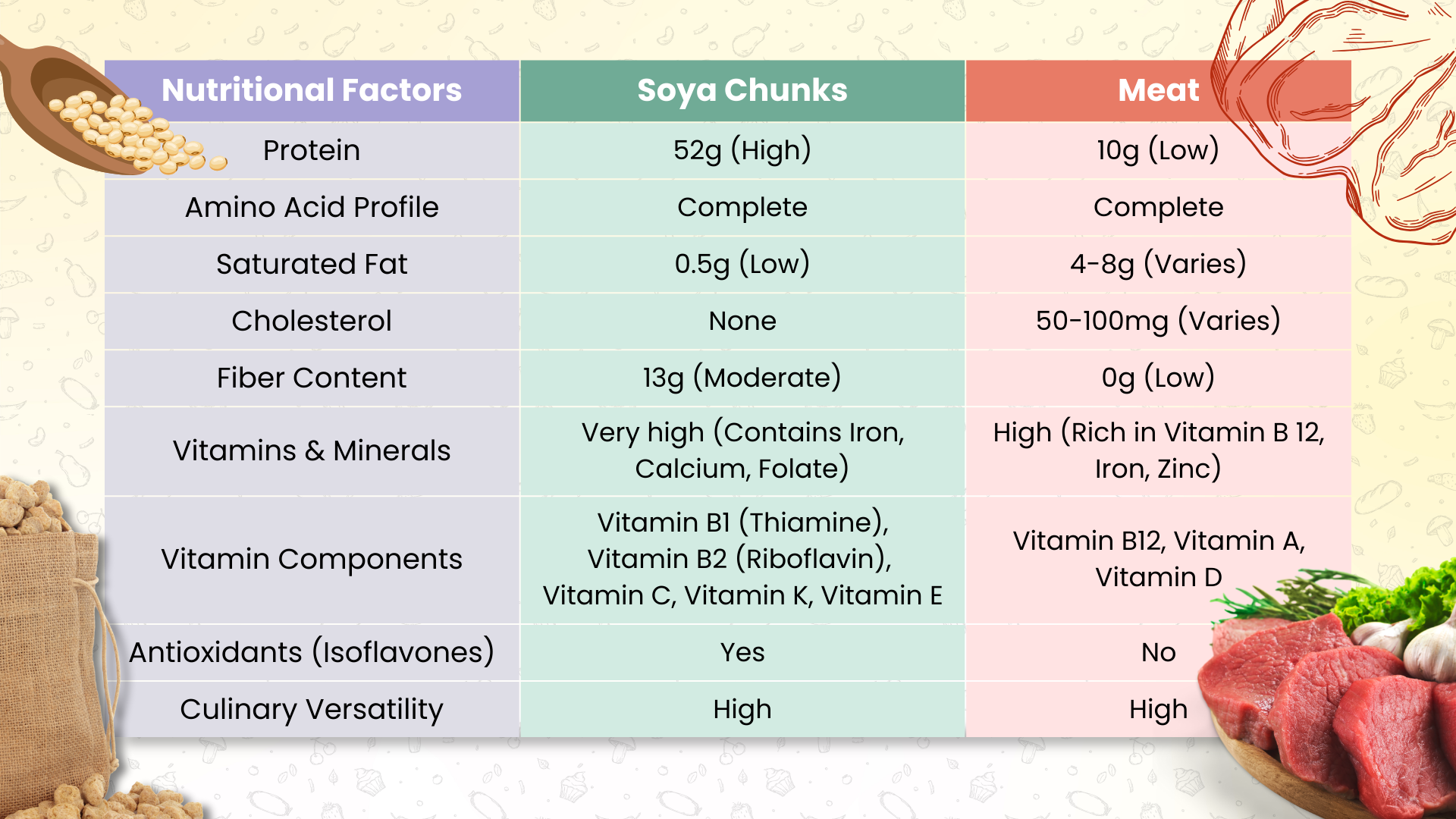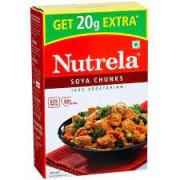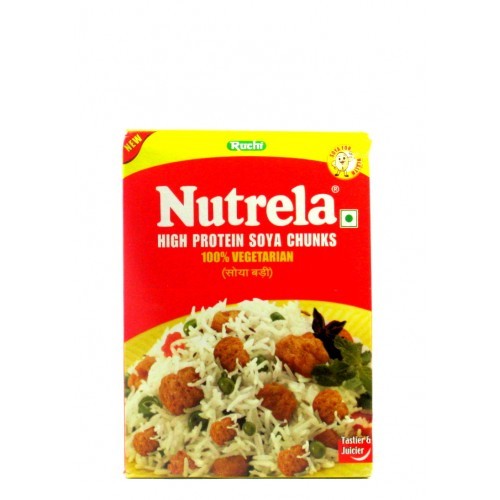
In recent years, dietary choices have become a significant topic of discussion, with an increasing number of individuals opting for healthier alternatives to traditional ingredients.
Soya chunks and meat are two such options that often find themselves in the spotlight. Both are rich sources of protein and have their own sets of advantages and disadvantages.
Let's explore the nutritional aspects of soya chunks and meat, helping you make an informed decision about which might be better for your health.
Soya Chunks: A Plant-Based Protein Source
Soya chunks, also known as soy protein or textured vegetable protein (TVP), are made from defatted soy flour. They are widely used as a meat substitute due to their meaty texture and ability to absorb flavors. Here's a look at some of their health benefits:
-
Plant-Based Protein: Soya chunks are a fantastic source of plant-based protein. They provide all the essential amino acids needed for optimal health, making them a suitable option for vegetarians and vegans.
-
Low in Saturated Fat: Soya chunks are naturally low in saturated fat, making them heart-friendly and suitable for those watching their cholesterol levels.
-
Cholesterol-Free: Being plant-based, soya chunks contain no cholesterol, unlike some types of meat.
-
Rich in Fiber: Soya chunks are a good source of dietary fiber, which aids in digestion and can contribute to a feeling of fullness.
-
Isoflavones: Soya contains compounds called isoflavones, which have antioxidant properties and might offer potential health benefits, such as reducing the risk of certain chronic diseases.
Order Indian Grocery Delivery like Soya chunks, authentic Indian spices, traditional items, and more at free shipping charges nationwide from our website or mobile app.
Types of Soya Chunks
-
Standard Soya Chunks: Meat-like chunks of the usual size, ideal for curries, stir-fries, and heavy gravies. There are so many perfect choices for normal cooking.
-
Mini Soya Nuggets: Mini-sized, bite-sized chunks, for snacking, pulao, or salads while adding some protein to light meals
-
Soya Granules: Fine textured, minced chunks, best for keema or fillings and substituted by ground meat in a recipe.
-
Flavored Soya Chunks: This pre-seasoned chunk with all varieties of flavors saves time in delivering quick and delicious meals
-
Organic Soya Chunks: Made from non-GMO soybeans free from chemicals for health-conscious and eco-conscious consumer
-
High-Protein Soya Chunks: Extra protein content and particularly designed for the fitness enthusiast or person who needs a high-energy meal
-
Low-Fat Soya Chunks: Prepared with lesser fat. Excellent for weight management and heart-healthy diets.
-
Soya Chunks Powder: It comes in fine powdered form, preferred with soups, stews, or smoothies.
Best Indian Soya Chunks Brands
-
Nutrela
A trusted brand for high protein, non-GMO soya chunks with consistent quality.
Features of the Nutrela Soya Chunks:
-
They have calcium, fiber, and iron
-
They are easy to cook
-
They can be purchased in many sizes of packaging Advantages:
-
Fortune
The soft, easy-cook, perfect soya chunk for Indian recipes with quality premium soya chunks.
Features:
-
The highest protein content in a vegetarian diet
-
Available as Soya Chunks, Mini Soya Chunks, Soya Granules
-
15 times more proteins, 13 % dietary fiber, 99% fat-free.
-
Patanjali
Organic and natural soya chunks from the most popular brand for health-conscious consumers.
Features:
-
Patanjali High Nutri Soya Chunks contain high protein and low fat
-
It can be served as a meat alternative to both vegans and vegetarians
-
It can be added to several dishes to add protein.
-
Saffola
Softer texture, and higher protein content for healthy meals.
Features:
-
Processed by extrusion of defatted soy flour extracted from wholesome soya beans
-
Carried indispensable nutritional elements including dietary fiber and protein, among others
-
Ingredients are selected, evaluated, and blended under strict control
Meat: An Animal-Based Protein Source
Meat is a staple in many diets and is known for its high protein content and rich flavor. However, there are certain considerations when it comes to its impact on health:
-
Complete Protein Source: Meat is a complete protein source, providing all essential amino acids required by the body.
-
Vitamin and Mineral Content: Meat, especially lean cuts, is a good source of vitamins like B12, iron, and zinc, which are essential for various bodily functions.
-
Satiety: Protein from meat can help with satiety and weight management, as it takes longer to digest compared to some other nutrients.
-
Saturated Fat: Depending on the type and cut, meat can contain varying amounts of saturated fat, which should be consumed in moderation to maintain heart health.
-
Environmental Impact: Meat production can have a higher environmental footprint compared to plant-based protein sources like soya chunks.
Ongoing Debate: Plant-Based vs. Meat Diets
The ongoing debate between plant-based and meat diets revolves around several key factors:
-
Health Impact: Plant-based diets are associated with a lower risk of chronic diseases such as heart disease, diabetes, and certain types of cancer. These diets tend to be lower in saturated fats and cholesterol, which are more prevalent in meat-based diets. However, the quality of plant-based diets matters; consuming nutrient-dense whole plant foods is crucial for reaping health benefits.
-
Environmental Sustainability: Plant-based diets generally have a lower environmental footprint compared to meat-based diets. Meat production requires more land, water, and energy, contributing to deforestation, greenhouse gas emissions, and resource depletion. Thus, promoting plant-based diets can have positive environmental implications.
-
Ethical Considerations: Concerns about animal welfare and the ethics of consuming animals play a role in the debate. Plant-based diets avoid the direct harm and exploitation of animals, aligning with the beliefs of individuals who prioritize ethical considerations.
Importance of Plant-Based Diets
-
Nutrient Diversity: Plant-based diets encourage the consumption of a wide variety of fruits, vegetables, whole grains, legumes, nuts, and seeds, providing a diverse array of nutrients and phytochemicals essential for optimal health.
-
Fiber-Rich: Plant-based diets are typically high in dietary fiber, promoting digestive health, and satiety, and reducing the risk of conditions like constipation and diverticulitis.
-
Heart Health: Plant-based diets are associated with improved heart health due to their lower saturated fat content. They can help lower blood pressure, reduce cholesterol levels, and decrease the risk of cardiovascular diseases.
-
Weight Management: Plant-based diets, when focused on whole foods, tend to be lower in calorie density and can support weight management and even weight loss.
-
Longevity: Studies suggest that those who follow plant-based diets have a lower risk of mortality from various causes compared to those who consume meat regularly.
Quick Soya Recipes for Last-Minute Hunger!
-
Soya Chunks Soup
Boil the soya chunks and keep them aside. In a pan, heat oil, and sauté garlic and ginger till fragrant. Add the vegetables such as carrots, beans, and cabbage. Pour the vegetable or chicken stock, and bring to a boil. Add the soya chunks along with soy sauce, salt, and pepper. Simmer for 10 minutes and relish this warm and comforting soup.
-
Soya Wrap
Sauté the boiled soya chunks with chopped onions, capsicum, and spiky masalas like paprika or garam masala. Spread mayonnaise or mint chutney on a roti or tortilla. Layer the sautéed soya mixture with fresh veggies such as lettuce and julienned carrots. Roll it well and wrap it with foil. This is a healthy, tasty meal on the go!
-
Soya Cutlets
Crush the cooked soya lumps with cooked mixed vegetables and bread crumbs in a bowl. Add ginger, garlic, and spices such as red chili powder and garam masala. You have to give it a cutlet shape and shallow fry in oil till crispy. Serve as a starter or use it in burgers for a healthy twist.
-
Soya Fried Rice
Boil and squeeze soya chunks and cut them into small pieces. Heat oil in a wok and sauté minced garlic, onions, and mixed vegetables. Add cooked rice, soy sauce, and vinegar. Mix everything well and then toss in the soya chunks, stir-frying just for a couple of minutes. It's a quick, savory dish to make perfect even for busy weeknights!
Making the Choice: Your Health and Preferences
Ultimately, the choice between soya chunks and meat comes down to personal health goals, dietary preferences, and ethical considerations. Both options offer their nutritional benefits, and incorporating a variety of protein sources can contribute to a balanced diet.
For those looking to explore the world of plant-based protein or simply diversify their meals, soya chunks present a viable and nutritious alternative. They are versatile and can be used in a variety of dishes to provide the desired texture and flavor.

Explore Indian Cuisine with Quicklly: Bringing Authentic Flavors to Your Doorstep
We offer an extensive range of Indian grocery products, from pantry staples to traditional items, spices, cooking oils, Indian Ready To Eat Meals, and Indian meal kits. With nationwide free delivery, you can indulge in warm Indian curries and other delicacies from the comfort of your home. Visit our website or mobile app today and explore the rich flavors of Indian cuisine.
Disclaimer: The opinions expressed in this guest blog belong solely to the author, and do not necessarily reflect the views of Quicklly. We are not responsible for the accuracy, completeness, or reliability of any statements made within this article.











-can-fuel-your-active-lifestyle-in-indian-snacks.jpg)






 USA
USA Canada
Canada